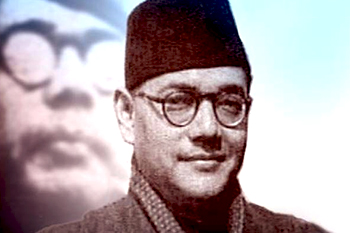London, Jan 17: Going with the latest set of witness statements released by a UK-based website - freedom fighter Netaji Subhas Chandra Bose died as a result of a plane crash in Taiwan.

"There are no two opinions between the five witnesses about the fact that Bose's end came on the night of 18 August 1945," www.bosefiles.info said in a statement.
Colonel Habibur Rehman Khan, Bose's aide-de-camp (ADC) who was with him on the fateful day and survived the crash, submitted a statement written and signed on 24 August 1945 - six days after the crash confirming Bose's last words to him.
"Prior to his death he (Bose) told me that his end was near and asked me to convey a message from him to our countrymen to the following effect: 'I have fought to the last for India's independence and now am giving my life in the same attempt. Countrymen! Continue the independence fight. Before long India will be free. Long Live Azad Hind'," the statement reads.
In September 1945, two intelligence teams from India led by police officers named Finney and Davis, assisted by H K Roy and K.P. De, went to Bangkok, Saigon and Taipei to investigate. They concluded Bose had died as a result of the air tragedy.
They seized a copy of a telegram from the Chief of Staff of the Japanese Southern Army to Hikari Kikan, a body set up to liaise between the Japanese government and Bose's "Provisional Government of Free India".
Using the code "T" for Bose, the cable dated 20 August 1945 said: "T", while on his way to the capital (Tokyo), as a result of an accident to his aircraft at TAIHOKU (Japanese name for Taipei) at 1400 hours on the 18th was seriously injured and died at midnight on the same date."
Between May and July of 1946, Lt Col J G Figgess of the British Army interrogated six Japanese officials in Tokyo in connection with the incident, including Japanese doctor Toyoshi Tsuruta, who was present at the Nanmon Military Hospital near the crash site where Bose was rushed to after the crash.
Dr Tsuruta submitted to Figgess: "...Bose asked him in English if he would sit with him throughout the night.
However, shortly after seven o'clock (in the evening) he suffered a relapse and although the doctor once again administered a camphor injection he sank into a coma and died shortly afterwards."
Tsan Pi Sha, a nurse at the same hospital, confirmed this account in in September 1946 to Harin Shah, a journalist with Mumbai's 'Free Press Journal', who visited Taipei to investigate the matter.
She said: "He died here. I was by his side...He died on 18 August last year (1945), (Subhas) Chandra Bose. I am a surgical nurse and took care of him till he died...I was instructed to apply olive oil all over his body and that I did."
"Whenever he regained briefly his consciousness, he felt thirsty. With slight groaning, he would ask for water. I gave him water several times," she added.
She, then, took Shah to the south-west corner of the ward and to the bed where Bose passed away.
The medical officer in charge of the hospital was Captain Taneyoshi Yoshimi of the Japanese Army. The first of several testimonies provided by Dr Yoshimi was on 19 October 1946 at Stanley Gaol in Hong Kong, where he was imprisoned by British authorities after World War II. This was recorded by Captain Alfred Turner of the War Crimes Liaison Section of Taiwan.
He said: "When he was laid on the bed (of the hospital), I personally cleaned his (Bose's) injuries with oils and dressed them. He was suffering from extensive burns over the whole of his body, though the most serious were those on his head, chest and thighs. There was very little left on his head in the way of hair or other identification marks.
"As most of his speaking was in English, a request for an interpreter was made, and one was sent from the civil government offices named Nakamura. He informed me that he had very often interpreted for (Subhas) Chandra Bose and had had many conversations with him. He appeared to have no doubt that the man he was speaking with was Chandra Bose.
"After the fourth hour (following his admission to the hospital) he appeared to be sinking into unconsciousness. He murmured and muttered in his state of coma, but never regained consciousness. At about 2300 hours he died."
Dr Yoshimi went on to appear before both the Major General. Shah Nawaz led Netaji Inquiry Committee in 1956 and the 1974 Justice G.D. Khosla Commission.
In one of his later interviews to Ashis Ray, creator of www.bosefiles.info, in 1995, Dr Yoshimi said: "A lieutenant called Nonomiya told me this is Mr Chandra Bose, a very important person, and that I should save his life at any cost. That's how I knew who he (Bose) was."
He recalled that when it seemed obvious to him that Bose's condition was sinking, he asked the patient: "What can I do for you?"
Bose replied: "I feel as if blood is rushing to my head. I would like to sleep a while." Dr Yoshimi gave him an injection and after some time he was no more.
The interpreter, Nakamura, deposed before the Inquiry Committee that there was "not a word of complaint either of pain or suffering from his lips… This composure of Netaji (Bose) surprised all of us."
He went on to say that after Bose expired, the Japanese officers in the room stood in one line and saluted his body.





Comments
Add new comment